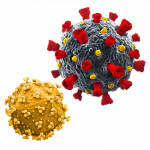The HIV Vaccine Trials Network (HVTN), which is funded by the National Institutes of Health (NIH), has launched its first clinical trial in response to the novel coronavirus pandemic.
The new coronavirus, officially named SARS-CoV-2, causes the disease known as COVID-19.
The new study, called HVTN 405/HPTN 1901, has begun at sites in 17 cities in the United States as well as sites in Lima and Iquitos, Peru. The investigators behind the study plan to enroll about 400 adults who tested positive for the presence of SARS-CoV-2 and have since recovered from COVID-19 illness.
All participants must make one clinic visit; they then will have the option to make additional visits two, four and 12 months later. At each visit, they will receive a blood draw and will have the option of getting tested for the virus through a nasal sampling procedure.
The study will exclude anyone who still has symptoms of COVID-19 or, if they are asymptomatic, has not yet passed two weeks since their last positive SARS-CoV-2 test.
The investigators are seeking to use the samples they collect to guide them in developing tests that can reliably detect the presence of SARS-CoV-2 antibodies for use in future vaccine and cloned antibody studies. The antibodies in the collected samples will be used to determine their potential to provide immune protection against the virus.
The study will also characterize the body’s natural immune response to the virus in order to help guide the development of potential vaccines.
“The study includes an important milestone needed for SARS-CoV-2 vaccine development and will help create the infrastructure required to do sophisticated vaccine trials,” said Larry Corey MD, protocol chair and principal investigator of the HVTN Leadership Operations Center which is based at the Fred Hutchinson Cancer Research Center in Seattle.
“Our collaborative NIH-funded networks are fully committed to using our well-established research infrastructures to pivot into the prevention of COVID-19,” said Myron Cohen, MD, HPTN co–principal investigator and director of the Institute for Global Health and Infectious Diseases at the University of North Carolina–Chapel Hill School of Medicine. “This study is one of many that will help us better understand how the human immune system responds to SARS-CoV-2.”
To read the press release, click here.







Comments
Comments